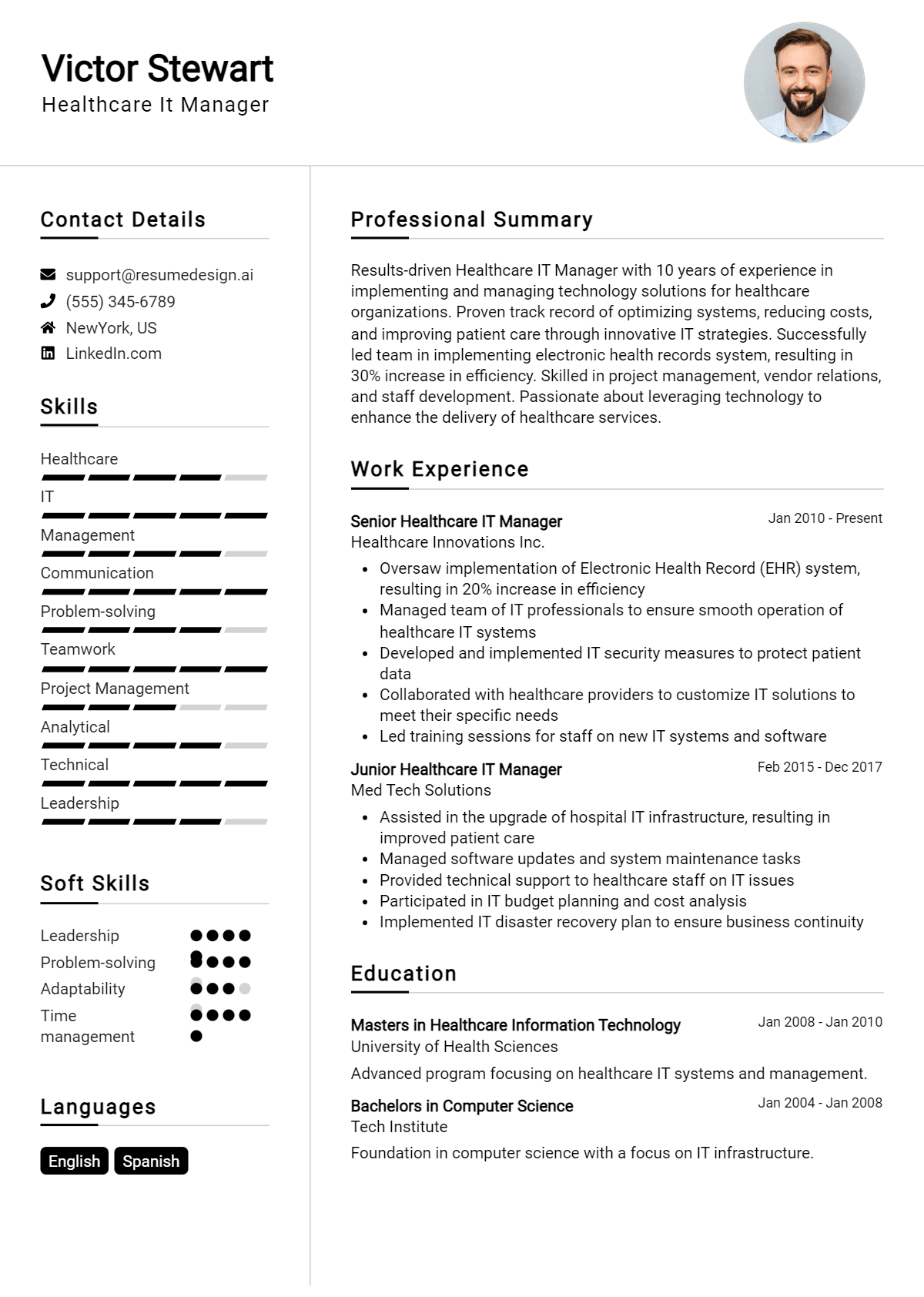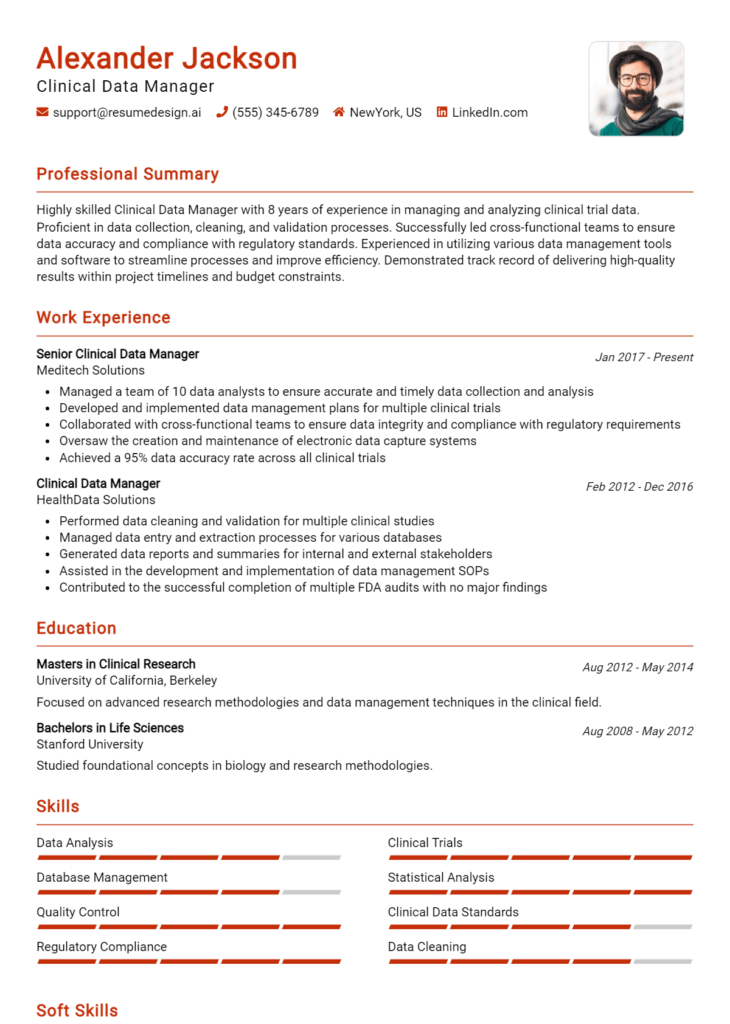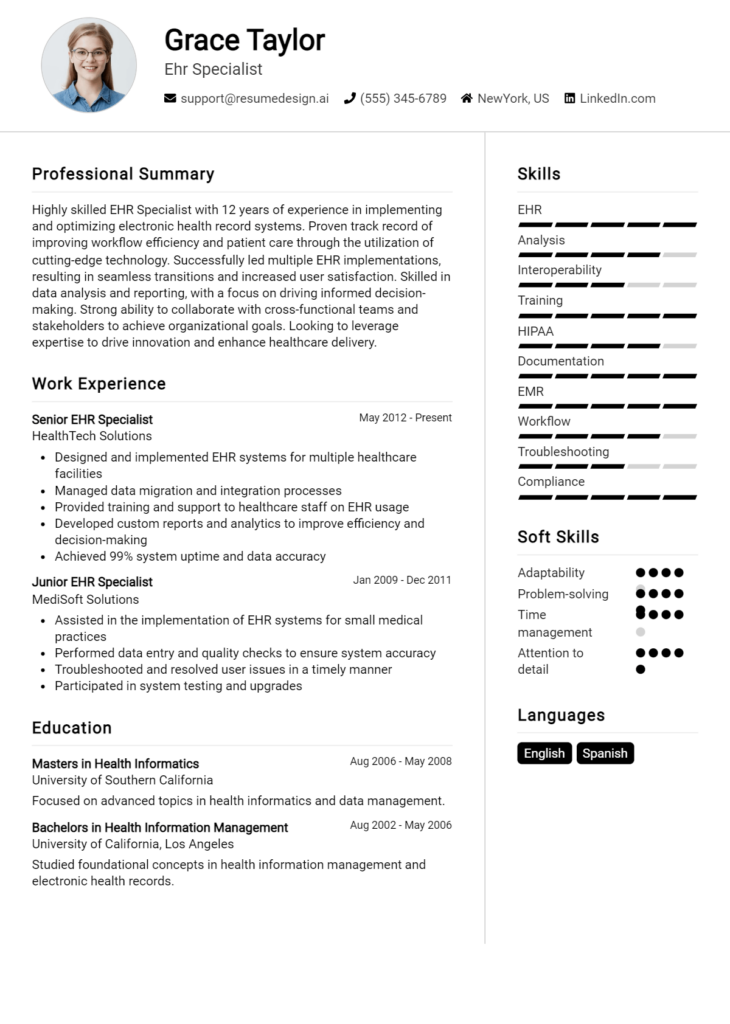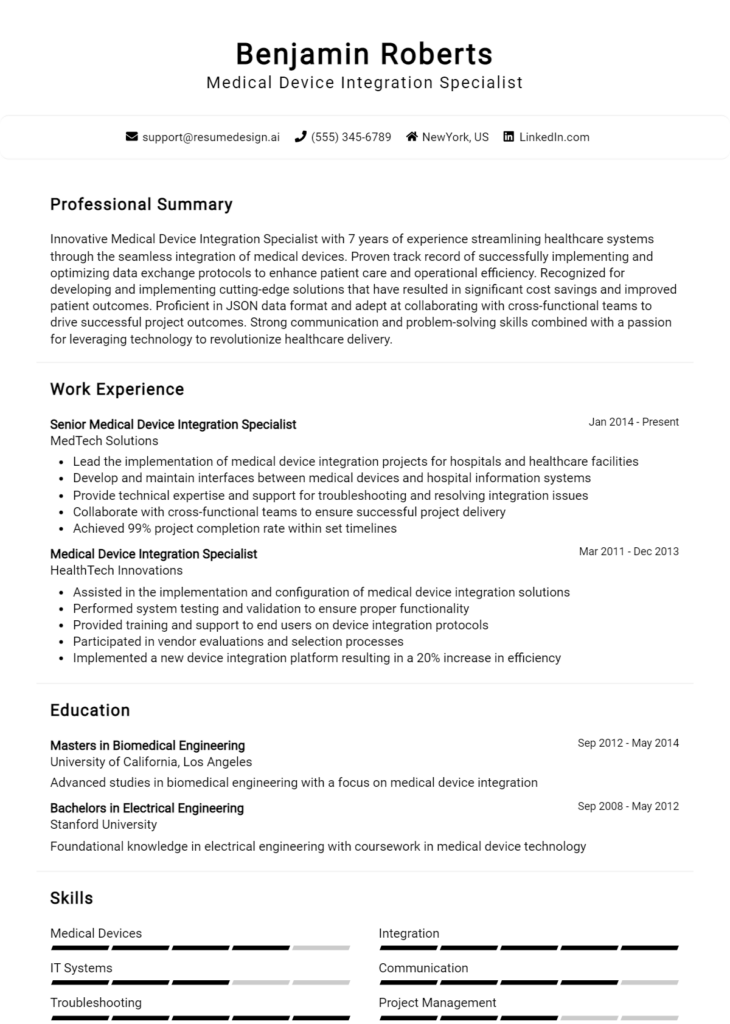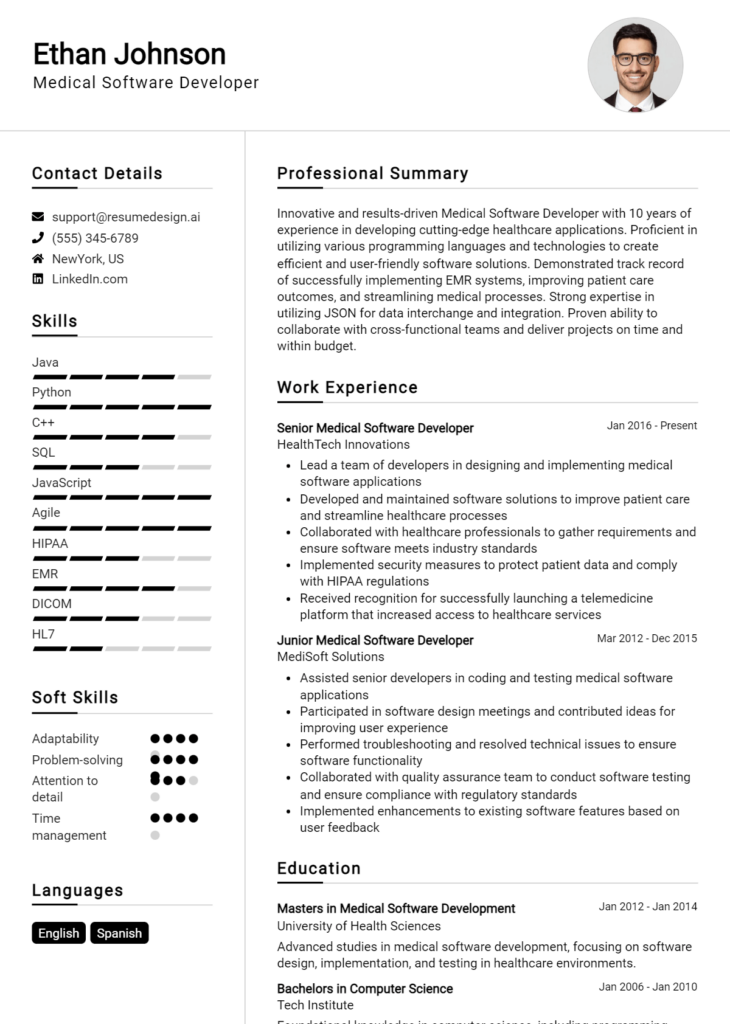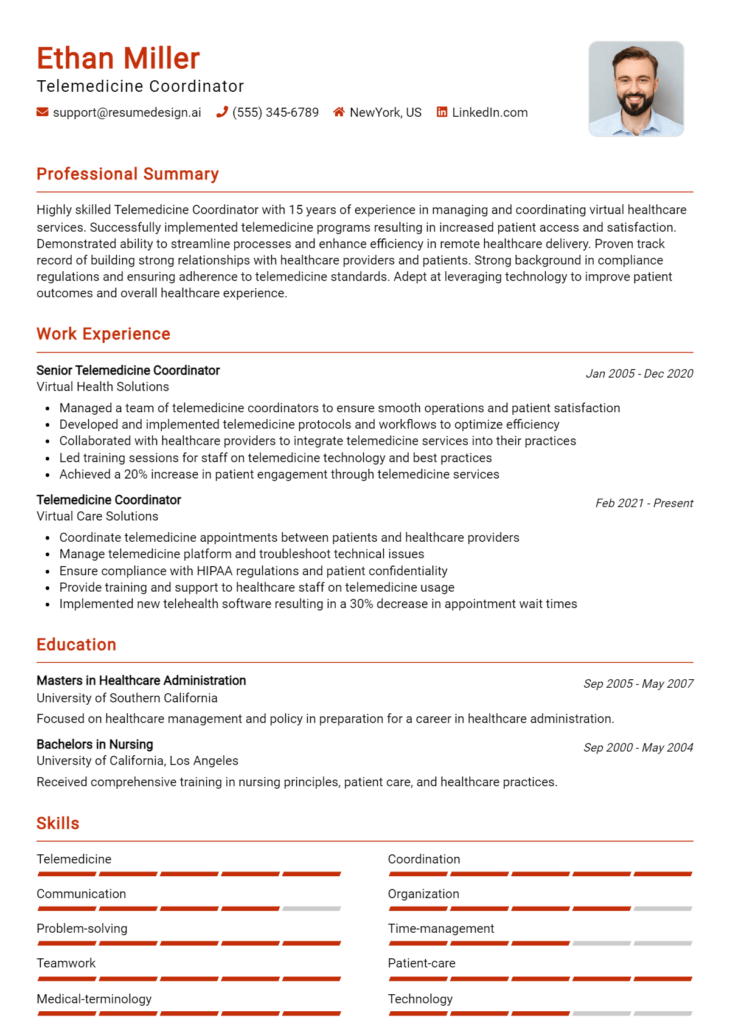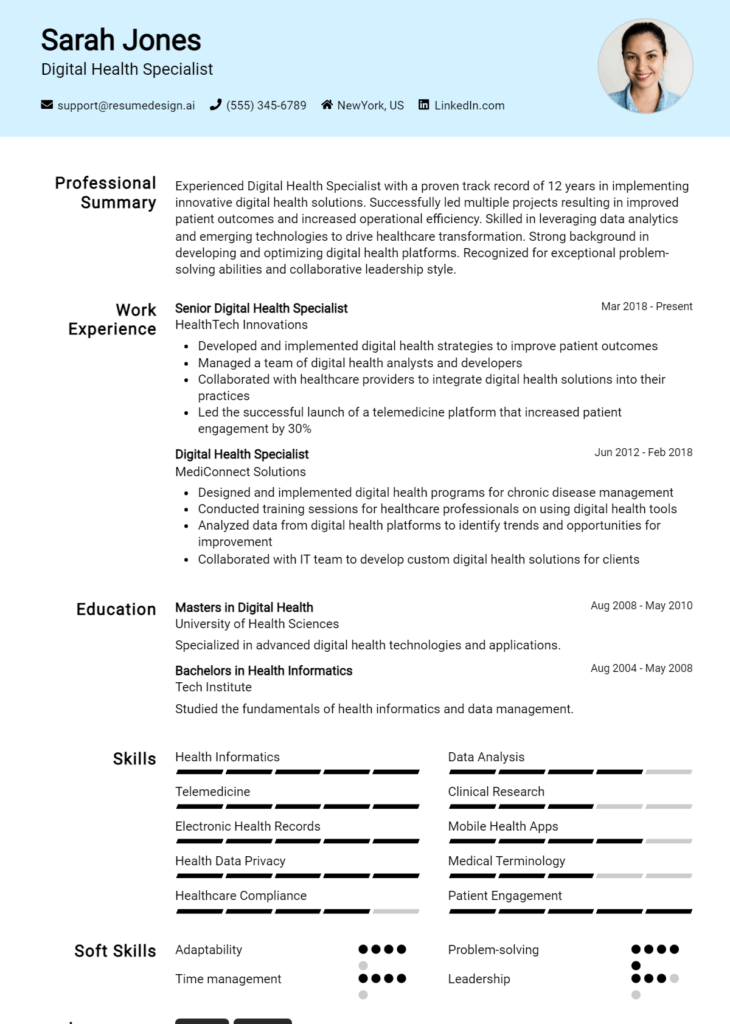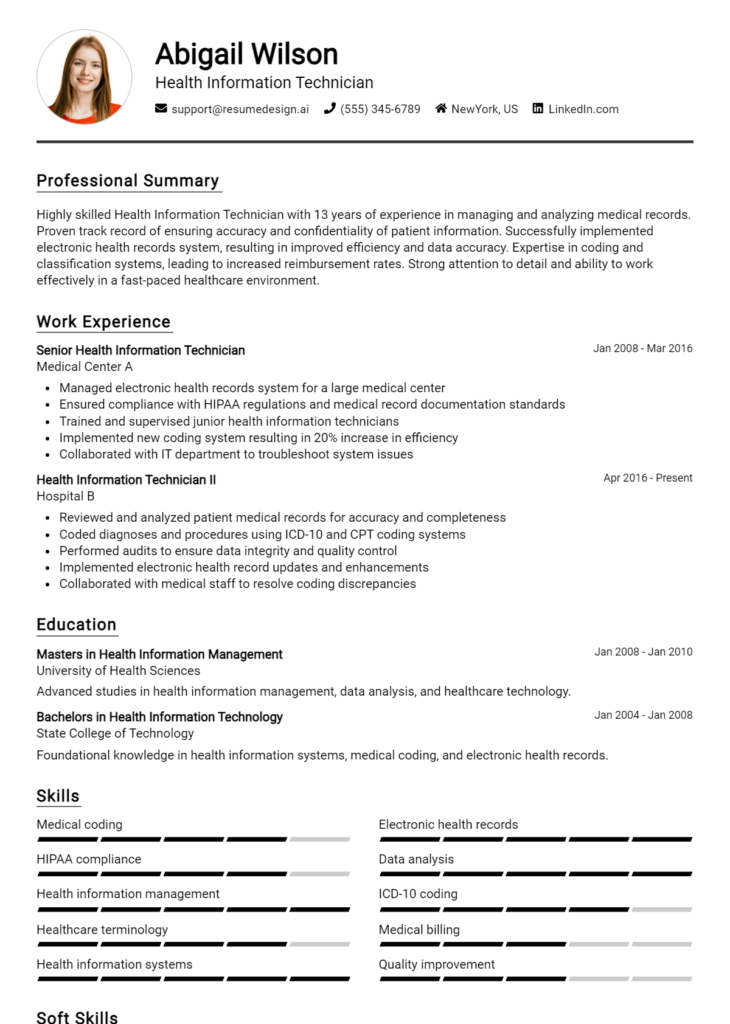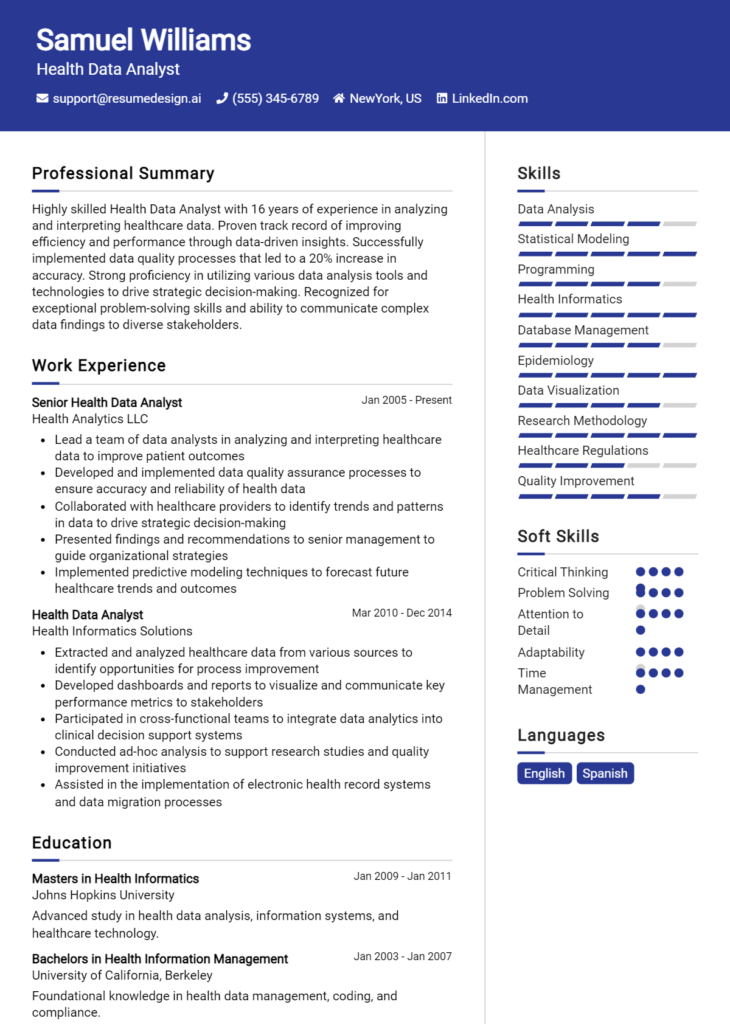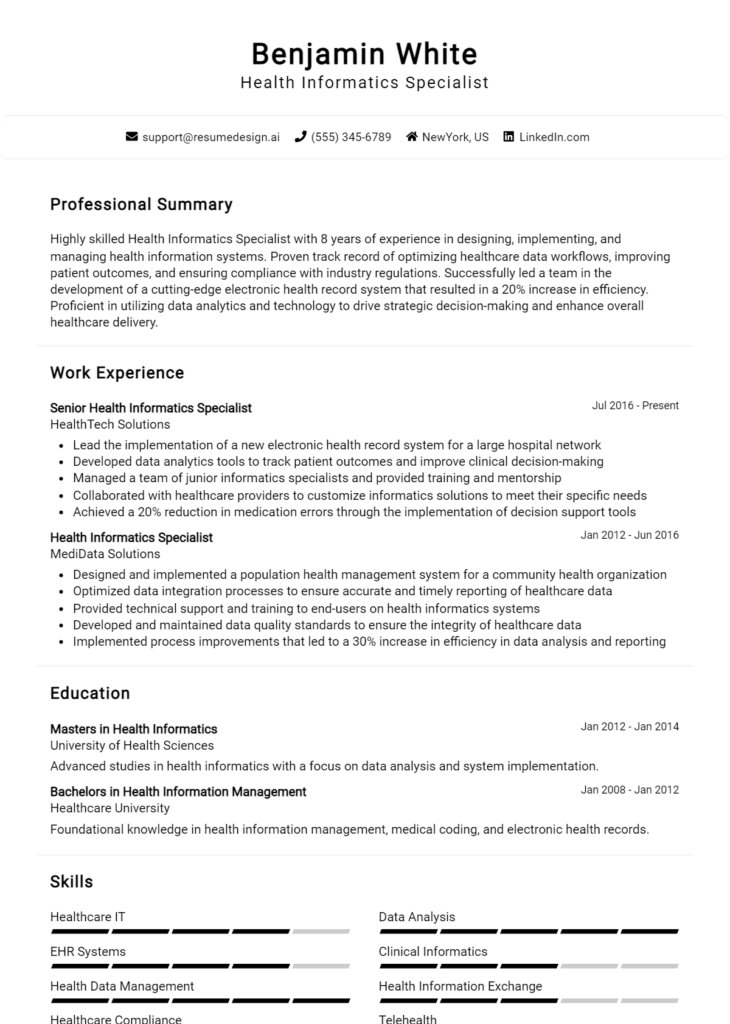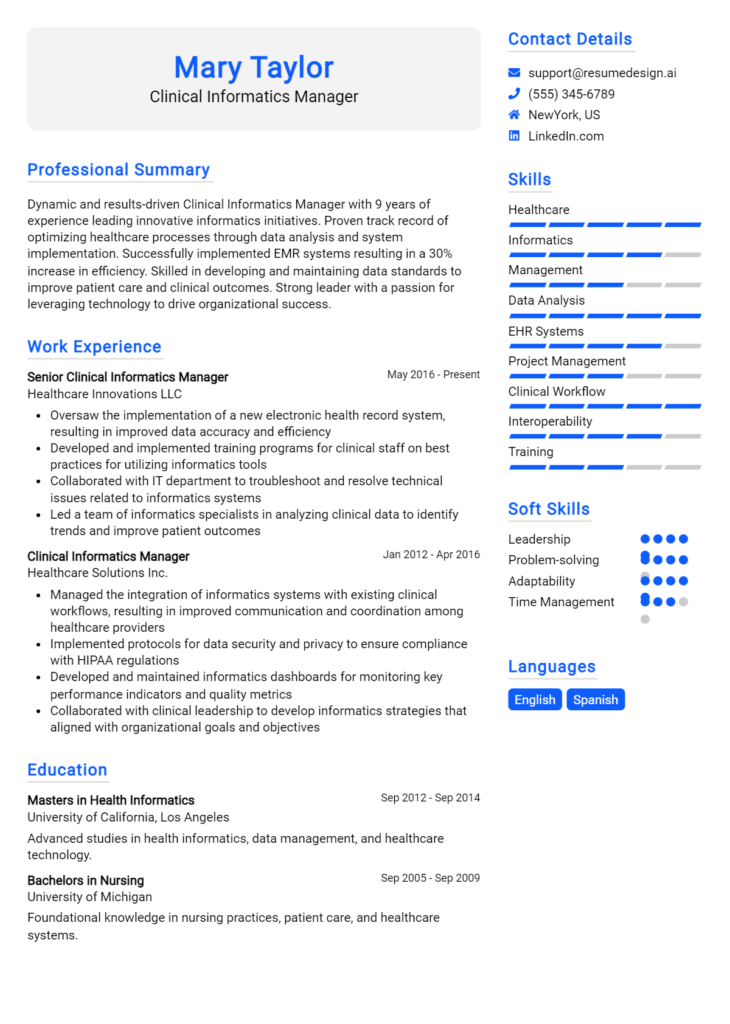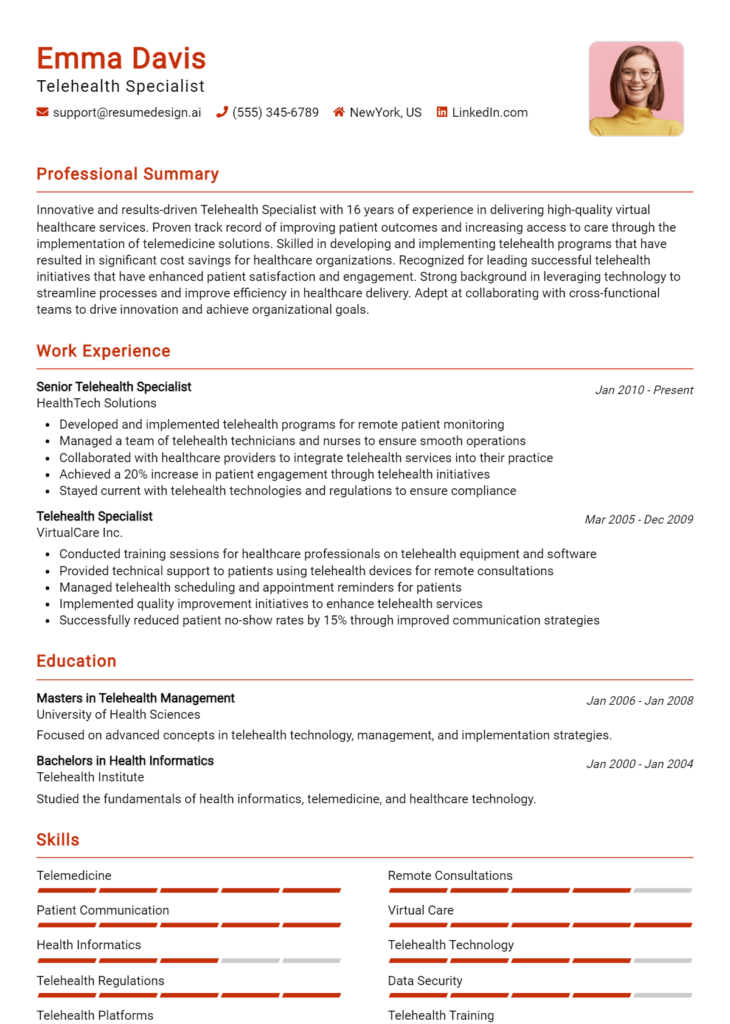Healthcare IT Manager Core Responsibilities
The Healthcare IT Manager plays a crucial role in integrating technology with healthcare operations, ensuring seamless communication between clinical and administrative departments. Key responsibilities include overseeing IT infrastructure, implementing electronic health records (EHR), and ensuring compliance with regulations. Strong technical skills, operational management expertise, and problem-solving abilities are essential for navigating complex healthcare environments. A well-structured resume effectively highlights these qualifications, showcasing the candidate's ability to contribute to the organization's overall goals and improve patient care.
Common Responsibilities Listed on Healthcare IT Manager Resume
- Manage and oversee healthcare IT systems and infrastructure.
- Implement and maintain electronic health record (EHR) systems.
- Ensure compliance with healthcare regulations and standards.
- Collaborate with clinical staff to optimize technology usage.
- Develop IT policies and procedures to enhance operational efficiency.
- Conduct staff training on new technologies and systems.
- Monitor system performance and troubleshoot issues.
- Coordinate with vendors for IT services and solutions.
- Manage budget for IT projects and systems upgrades.
- Ensure data security and patient confidentiality.
- Analyze data to support decision-making and improve healthcare outcomes.
High-Level Resume Tips for Healthcare IT Manager Professionals
In today's competitive job market, a well-crafted resume is essential for Healthcare IT Manager professionals seeking to make a lasting impression on potential employers. Your resume serves as your first point of contact, showcasing not only your technical expertise but also your achievements and leadership capabilities in the healthcare technology sector. It needs to effectively reflect your unique skills, experiences, and contributions to the industry. This guide will provide practical and actionable resume tips specifically tailored for Healthcare IT Manager professionals, ensuring you stand out in a crowded field.
Top Resume Tips for Healthcare IT Manager Professionals
- Tailor your resume to each job description by incorporating relevant keywords and phrases that align with the specific requirements of the position.
- Highlight your relevant experience in healthcare IT, focusing on roles that demonstrate your ability to manage complex systems and projects.
- Quantify your achievements by using metrics such as cost savings, efficiency improvements, or successful project completions to illustrate your impact.
- Showcase your technical skills, including specific software, systems, or methodologies you are proficient in that are relevant to healthcare IT.
- Include certifications and training that pertain to healthcare technology, such as HIPAA compliance, EMR systems, or health information management.
- Demonstrate your leadership capabilities by highlighting instances where you managed teams, led projects, or contributed to strategic planning.
- Utilize action verbs to convey your contributions more effectively, such as "implemented," "developed," or "optimized."
- Maintain a clean and professional format that enhances readability, utilizing clear headings and bullet points to organize content effectively.
- Incorporate a summary statement that succinctly captures your career goals and what you bring to the role of Healthcare IT Manager.
- Proofread carefully to eliminate any errors or inconsistencies, ensuring your resume reflects professionalism and attention to detail.
By implementing these tips, you can significantly increase your chances of landing a job in the Healthcare IT Manager field. A targeted and polished resume not only showcases your qualifications but also demonstrates your commitment to the role and the value you can bring to a potential employer.
Why Resume Headlines & Titles are Important for Healthcare IT Manager
In the competitive field of healthcare IT management, a resume headline or title serves as a crucial first impression for job applicants. A well-crafted headline can immediately capture the attention of hiring managers, allowing them to quickly assess a candidate's suitability for the role. It acts as a succinct summary of the candidate's key qualifications, skills, and experiences, encapsulating their professional identity in a single impactful phrase. To be effective, the headline should be concise, relevant, and directly aligned with the specific job being applied for, ensuring it resonates with the needs of the hiring organization.
Best Practices for Crafting Resume Headlines for Healthcare IT Manager
- Keep it concise: Aim for one impactful phrase that summarizes your qualifications.
- Be specific: Tailor the headline to reflect the specific role and responsibilities of a Healthcare IT Manager.
- Highlight key skills: Incorporate essential skills or certifications relevant to the position.
- Use industry keywords: Include terms and phrases that are commonly recognized in healthcare IT.
- Showcase achievements: If possible, reference notable accomplishments that set you apart.
- Maintain professionalism: Ensure the tone and language reflect a professional demeanor appropriate for the healthcare industry.
- Avoid jargon: Use clear language that is easily understood, avoiding overly technical terms unless relevant.
- Revise for clarity: Edit your headline to ensure it communicates your value proposition effectively.
Example Resume Headlines for Healthcare IT Manager
Strong Resume Headlines
"Transformative Healthcare IT Manager with 10+ Years of Experience in System Integration and Data Security"
“Proven Leader in Healthcare IT Solutions, Enhancing Patient Care through Innovative Technology Implementations”
“Results-Driven Healthcare IT Manager Specializing in Cloud Solutions and Regulatory Compliance”
Weak Resume Headlines
“IT Manager Looking for a Job”
“Experienced Professional in Technology”
The strong headlines are effective because they clearly communicate the candidate's experience, skills, and unique contributions that align with the needs of a Healthcare IT Manager position. They provide specific insights into what the candidate brings to the table, making it easier for hiring managers to see their value. In contrast, the weak headlines lack specificity and fail to convey any relevant qualifications or achievements, making them less impactful and memorable. These generic phrases do not differentiate the candidate from others, leading to missed opportunities in the competitive job market.
Writing an Exceptional Healthcare IT Manager Resume Summary
A well-crafted resume summary is critical for a Healthcare IT Manager, as it serves as the first impression for hiring managers. This brief overview quickly encapsulates key skills, relevant experience, and notable accomplishments, making it an essential tool for standing out in a competitive job market. A strong summary should be concise and impactful, directly tailored to the specific job the candidate is applying for, ensuring that the most pertinent information is highlighted to capture the attention of decision-makers effectively.
Best Practices for Writing a Healthcare IT Manager Resume Summary
- Quantify achievements: Use specific numbers or percentages to demonstrate the impact of your work.
- Focus on relevant skills: Highlight technical skills, project management expertise, and knowledge of healthcare regulations.
- Tailor the summary: Customize your summary to align with the job description and company values.
- Keep it concise: Aim for 3-5 sentences that provide a snapshot of your qualifications.
- Use action verbs: Start sentences with strong verbs to convey confidence and proactivity.
- Showcase certifications: Mention relevant certifications like HIPAA compliance or ITIL to boost credibility.
- Highlight leadership experience: If applicable, include examples of team management or cross-departmental collaboration.
- Emphasize problem-solving skills: Detail your ability to tackle challenges within healthcare IT environments.
Example Healthcare IT Manager Resume Summaries
Strong Resume Summaries
Dedicated Healthcare IT Manager with over 8 years of experience implementing electronic health record (EHR) systems, resulting in a 30% increase in patient data accuracy. Proven track record in managing cross-functional teams and optimizing workflows to enhance operational efficiency.
Results-driven Healthcare IT Manager with a comprehensive background in cybersecurity and data management. Successfully led a project that reduced data breaches by 40% through the implementation of advanced security protocols and staff training initiatives.
Experienced Healthcare IT Manager with expertise in integrating telemedicine solutions, increasing patient engagement by 50% within one year. Skilled in vendor management and budget oversight with a history of delivering projects on time and under budget.
Innovative Healthcare IT Manager specializing in health informatics and system interoperability. Achieved a 25% reduction in system downtime by streamlining IT support processes and enhancing staff training programs.
Weak Resume Summaries
Healthcare IT Manager with experience in various IT roles. I am looking for a position where I can use my skills.
IT professional with some experience in healthcare. I can manage projects and help teams work better together.
The examples above illustrate the distinction between strong and weak resume summaries. Strong summaries effectively quantify achievements and highlight specific skills relevant to the Healthcare IT Manager role, demonstrating real impact and results. In contrast, weak summaries lack detail and specificity, making them too vague and generic to capture the interest of hiring managers.
Work Experience Section for Healthcare IT Manager Resume
The work experience section of a Healthcare IT Manager resume is pivotal in illustrating a candidate's technical acumen, leadership capabilities, and commitment to delivering high-quality healthcare IT solutions. This section not only demonstrates the applicant's proficiency in managing complex IT systems and teams but also highlights their ability to align with industry standards and best practices. By quantifying achievements—such as successful project implementations, cost savings, or efficiency improvements—candidates can effectively showcase their contributions to organizational goals and the healthcare industry at large.
Best Practices for Healthcare IT Manager Work Experience
- Highlight relevant technical skills, including expertise in electronic health records (EHR), data analytics, and cybersecurity.
- Quantify achievements using specific metrics, such as percentage improvements in system uptime or reductions in operational costs.
- Emphasize leadership experience by detailing team management, mentoring, and project oversight.
- Showcase collaboration efforts with cross-functional teams, including clinicians, administrators, and vendors.
- Use action verbs to describe responsibilities and accomplishments, such as "implemented," "led," and "optimized."
- Align work experience with industry standards and regulations, such as HIPAA compliance and interoperability requirements.
- Include relevant certifications or training that enhance your credibility in healthcare IT management.
- Tailor the work experience section to the specific job description, using keywords that reflect the employer's needs.
Example Work Experiences for Healthcare IT Manager
Strong Experiences
- Led a team of 15 IT professionals in the successful implementation of a new EHR system, resulting in a 30% increase in operational efficiency and a 20% reduction in documentation errors.
- Managed a $2 million annual IT budget while achieving a 15% cost reduction through strategic vendor negotiations and process optimizations.
- Developed and executed a comprehensive cybersecurity strategy that improved data protection compliance by 40%, safeguarding sensitive patient information.
- Collaborated with clinical staff to streamline patient data access, enhancing workflow and reducing patient wait times by 25%.
Weak Experiences
- Worked on various IT projects during my time at the healthcare organization.
- Assisted in managing the IT team and contributed to some team meetings.
- Helped with the implementation of new software without detailing specific outcomes.
- Involved in training staff on IT systems but did not specify the number of staff or improvements made.
The examples of strong experiences are considered effective because they clearly articulate specific achievements, quantify results, and demonstrate leadership and collaboration in impactful ways. In contrast, the weak experiences lack detail, measurable outcomes, and clarity, making it difficult for potential employers to assess the candidate's true capabilities and contributions to previous organizations.
Education and Certifications Section for Healthcare IT Manager Resume
The education and certifications section of a Healthcare IT Manager resume plays a crucial role in showcasing a candidate's academic qualifications, industry-specific knowledge, and commitment to professional development. This section not only highlights relevant degrees and certifications but also emphasizes the candidate's dedication to continuous learning and staying updated with the latest healthcare technologies and regulations. By providing details on relevant coursework, specialized training, and recognized credentials, candidates can significantly enhance their credibility and demonstrate their alignment with the requirements of the job role.
Best Practices for Healthcare IT Manager Education and Certifications
- Focus on relevant degrees, such as a Bachelor's or Master's in Healthcare Administration, Information Technology, or Health Informatics.
- Include industry-recognized certifications, such as Certified Healthcare Technology Specialist (CHTS) or Certified Health Informatics Systems Professional (CHISP).
- Detail relevant coursework or specialized training that directly relates to healthcare IT management.
- Highlight any continuing education courses or workshops that demonstrate a commitment to staying current in the field.
- Use clear and concise formatting to make the information easily digestible for hiring managers.
- Prioritize more advanced or specialized credentials that can set you apart from other candidates.
- Consider including dates of completion to show the recency of your education and certifications.
- Tailor the section to align with the specific requirements of the job you are applying for.
Example Education and Certifications for Healthcare IT Manager
Strong Examples
- Bachelor of Science in Health Information Management, University of California, 2015
- Certified Healthcare Technology Specialist (CHTS), 2021
- Master of Health Informatics, Johns Hopkins University, 2018
- Coursework in Data Analytics for Healthcare, Coursera, 2022
Weak Examples
- Bachelor of Arts in English Literature, University of Florida, 2010
- Certification in Office Management, 2010
- Basic Computer Skills Course, 2015
- High School Diploma, 2005
The strong examples are considered effective as they directly align with the qualifications required for a Healthcare IT Manager, showcasing relevant degrees and certifications that demonstrate the candidate's expertise in healthcare technology. In contrast, the weak examples lack relevance to the healthcare IT field, featuring outdated or unrelated educational qualifications that do not support the candidate's suitability for the role.
Top Skills & Keywords for Healthcare IT Manager Resume
A well-crafted resume for a Healthcare IT Manager is crucial in showcasing your qualifications and expertise in this rapidly evolving field. Employers are increasingly seeking candidates with a blend of technical knowledge and interpersonal skills to navigate the complexities of healthcare technology. Highlighting your skills effectively can set you apart from other candidates, making it essential to tailor your resume to reflect both hard and soft skills that align with the specific demands of the job. By doing so, you not only demonstrate your capability to manage healthcare IT systems but also your ability to collaborate with various stakeholders, which is vital in ensuring the seamless integration of technology into healthcare practices.
Top Hard & Soft Skills for Healthcare IT Manager
Soft Skills
- Leadership
- Communication
- Problem-solving
- Teamwork
- Adaptability
- Critical thinking
- Time management
- Conflict resolution
- Empathy
- Project management
Hard Skills
- Electronic Health Records (EHR) management
- Health Information Systems (HIS)
- Data analysis and reporting
- Cybersecurity protocols
- Regulatory compliance (HIPAA, HITECH)
- Software development lifecycle (SDLC)
- IT infrastructure management
- Database management
- Cloud computing
- Systems integration
For more insights into how to effectively present your skills and work experience, consider exploring additional resources that can enhance your resume and improve your chances of landing the perfect Healthcare IT Manager position.
Stand Out with a Winning Healthcare IT Manager Cover Letter
Dear Hiring Manager,
I am writing to express my interest in the Healthcare IT Manager position at [Company Name] as advertised on [Job Board/Company Website]. With over [X years] of experience in healthcare information technology, coupled with my passion for enhancing patient care through innovative IT solutions, I am excited about the opportunity to contribute to your esteemed organization. My background in managing diverse IT teams and implementing electronic health record (EHR) systems aligns perfectly with the requirements of this role.
In my previous role at [Previous Company], I successfully led the implementation of a new EHR system that improved data accessibility and streamlined workflows across departments. This project not only enhanced patient care delivery but also reduced operational costs by [X%]. My ability to collaborate with clinical staff and understand their needs allowed me to tailor IT solutions that significantly improved efficiency. I am adept at balancing the technical aspects of IT management with the necessity of compliance, ensuring that all systems meet HIPAA regulations while facilitating seamless patient information exchange.
I am particularly drawn to [Company Name] because of its commitment to leveraging technology to enhance healthcare delivery. I am eager to bring my expertise in project management, system integration, and team leadership to your organization. I am confident that my strategic vision and hands-on experience will contribute to advancing your IT initiatives while supporting the overarching goals of patient safety and quality care.
Thank you for considering my application. I look forward to the opportunity to discuss how my skills and experiences align with the needs of your team at [Company Name]. I am excited about the possibility of contributing to your mission and am eager to bring my dedication and expertise to your organization.
Sincerely,
[Your Name]
[Your Phone Number]
[Your Email Address]
Common Mistakes to Avoid in a Healthcare IT Manager Resume
When crafting a resume for the role of Healthcare IT Manager, it's essential to showcase your technical expertise as well as your understanding of the healthcare landscape. However, many candidates make critical mistakes that can undermine their chances of securing an interview. Avoiding these common pitfalls can significantly enhance your resume's effectiveness and increase your likelihood of standing out in a competitive field.
Neglecting Relevant Certifications: Failing to highlight certifications such as CPHIMS, CHCIO, or ITIL can give the impression that you lack essential credentials in healthcare IT management.
Overloading with Technical Jargon: Using excessive technical language without context can alienate hiring managers who may not have a deep IT background. Aim for clarity and relevance.
Ignoring Soft Skills: Focusing solely on technical skills while neglecting interpersonal skills can be a mistake. Healthcare IT Managers must communicate effectively with both IT staff and healthcare professionals.
Being Vague About Achievements: Instead of listing duties, quantify your achievements. Use specific metrics to demonstrate how you improved systems or processes, such as "reduced system downtime by 30%."
Failing to Tailor the Resume: Sending a generic resume without customizing it for the specific job description can lead to missed opportunities. Tailor your resume to align with the job's key requirements.
Listing Irrelevant Experience: Including unrelated job experiences can dilute your resume's impact. Focus on roles and responsibilities that directly relate to healthcare IT management.
Neglecting the Importance of Format: A cluttered or poorly formatted resume can be difficult to read. Use clear headings, bullet points, and a professional layout to enhance readability.
Forgetting to Include Continuing Education: In the rapidly evolving field of healthcare IT, neglecting to mention ongoing education or training can suggest you're not keeping up with industry trends and advancements.
Conclusion
In conclusion, the role of a Healthcare IT Manager is crucial in today’s healthcare landscape, where technology plays an integral part in enhancing patient care and operational efficiency. Key responsibilities include overseeing IT systems, ensuring compliance with health regulations, managing data security, and implementing innovative technological solutions to improve healthcare delivery. Additionally, effective communication and collaboration with healthcare providers and IT teams are essential for success in this role.
As you consider your career in this field, it’s vital to ensure that your resume reflects your skills and experiences accurately. Take the time to review your Healthcare IT Manager resume and make any necessary updates. Utilize available resources to strengthen your application:
- Explore a variety of resume templates that can help you stand out.
- Use the resume builder to create a professional and polished resume tailored to the Healthcare IT sector.
- Review resume examples to gather inspiration and understand what hiring managers are looking for.
- Don’t forget to craft a compelling cover letter using cover letter templates to complement your resume.
Take the next step in your career by ensuring your resume is ready to impress potential employers!

